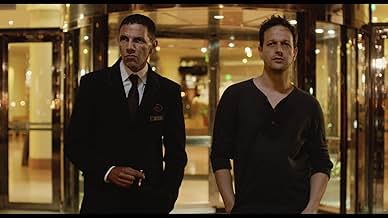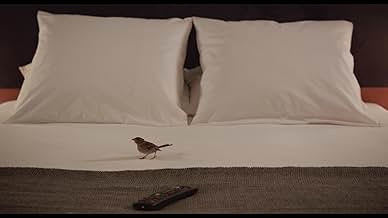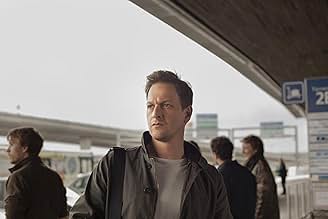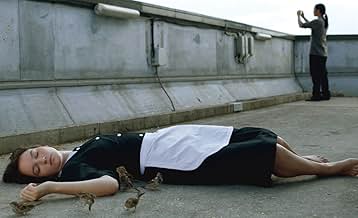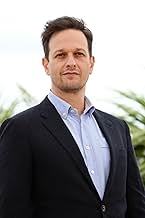VALUTAZIONE IMDb
6,1/10
3347
LA TUA VALUTAZIONE
Aggiungi una trama nella tua linguaIn an airport hotel on the outskirts of Paris, a Silicon Valley engineer abruptly chucks his job, breaks things off with his wife, and holes up in his room. Soon, fate draws him and a young ... Leggi tuttoIn an airport hotel on the outskirts of Paris, a Silicon Valley engineer abruptly chucks his job, breaks things off with his wife, and holes up in his room. Soon, fate draws him and a young French maid together.In an airport hotel on the outskirts of Paris, a Silicon Valley engineer abruptly chucks his job, breaks things off with his wife, and holes up in his room. Soon, fate draws him and a young French maid together.
- Regia
- Sceneggiatura
- Star
- Premi
- 2 vittorie e 6 candidature totali
Rojda Mohamed-Guedouar
- Passagère RER
- (as Rojda Mohamed)
Grégoire Taulère
- Passager RER
- (as Grégoire Aubouy Taulère)
Recensioni in evidenza
In a letter to Lou Andreas-Salome, the German Poet Rilke wrote, "The bird is a creature that has a very special feeling of trust in the external world, as if she knew that she is one with its deepest mystery." Using magic realism together with impressive camera work and CGI effects, Bird People reflects that mystery and turns it into a persuasive allegory of transformation. Directed by Pascale Ferran (Lady Chatterley) from a screenplay by Guillaume Bréaud, the film not only observes the alienation that exists in modern society, but goes beyond that to challenge our comfort level and glimpse what is possible.
Bird People depicts the lives of two very different people, Audrey (Anaïs Demoustier, The New Girlfriend), a maid at the Paris Hilton hotel in Paris close to the Charles de Gaulle Airport, and Gary Newman (Josh Charles, The Good Wife), a Silicon Valley engineer who is stopping overnight at the same hotel for a business conference en route to Dubai. Though they exist in totally different worlds, they are both stuck in life situations that are far from being nurturing. Neither can see a way out, until they do. As the film opens, the camera randomly peeks into the mind of travelers walking through airport terminals, riding on a commuter train or bus, enmeshed in their own world of smartphones, headphones, or simply daydreams.
There are no artistic or poetic visions in their thoughts, only internal conversations about appointments to keep, files to download, what to make for dinner, and other day-to-day minutia. Reminiscent of the Norwegian film, Oslo, August 31st, the people in the prologue have nothing to do with the stories that follow, but suggest that the difference is only in the level of awareness. Narrated by Mathieu Amalric who makes only a brief appearance in the film, the first hour concentrates on Gary (Charles), in Paris overnight and scheduled to leave the next day for Dubai. After experiencing a serious anxiety attack during the night, he makes some life-altering decisions the next morning.
Though his decisions appear to be impulsive, Gary tells others that he had thought about it for a long time. In a sudden one broom sweeps all move, he decides not to make the flight to Dubai, quits his job to the dismay of his business associates, and sells his stock to his partners. As if that wasn't enough housecleaning for one day, he tells his wife (Radha Mitchell, Silent Hill) that he is leaving her and the children, seemingly with little concern for their emotional consequences, though Ferran does not judge his actions, but simply records them. This "breakup" occurs in a face-to-face encounter during a stretched-out fifteen-minute Skype call, a process that is emotionally draining both for the characters and the viewer.
When pressed for a reason for his action, all he can come up with is that he "can't take it any longer" and has "had enough." Looking depressed and disheveled without any plans for the future, we fear for his life but Gary isn't ready to take any irrevocable steps of that nature, content to free himself only of his worldly responsibilities. Fortunately, the mood shifts as the second hour focuses on Audrey, a housekeeper at the hotel, as she goes about her routine of meticulously cleaning each room. Though in outward appearance, she is cheerful, there is a hint of an inescapable boredom and ennui in her life. Her only contact with people is to listen in on hallway conversations and sift through a guest's belongings in their room looking for a connection or an insight into who they are.
Peering into the windows of apartments across the courtyard with people living disconnected lives, she is again reminded of her sense of separation. What transpires, however, has nothing to do with her job, her family, or friends. It is a lovely flight of fancy that is too enchanting to reveal but includes an inspired Japanese artist, Audrey's discovery of a personal matter concerning the hotel concierge, all this amidst swooping aerial camera shots that lift the film from the stuffy hotel rooms and let it breathe. The trajectory of the film mirrors the words of the German poet Rilke, "If I don't manage to fly, someone else will. The spirit wants only that there be flying." In that regard, Bird People soars.
Bird People depicts the lives of two very different people, Audrey (Anaïs Demoustier, The New Girlfriend), a maid at the Paris Hilton hotel in Paris close to the Charles de Gaulle Airport, and Gary Newman (Josh Charles, The Good Wife), a Silicon Valley engineer who is stopping overnight at the same hotel for a business conference en route to Dubai. Though they exist in totally different worlds, they are both stuck in life situations that are far from being nurturing. Neither can see a way out, until they do. As the film opens, the camera randomly peeks into the mind of travelers walking through airport terminals, riding on a commuter train or bus, enmeshed in their own world of smartphones, headphones, or simply daydreams.
There are no artistic or poetic visions in their thoughts, only internal conversations about appointments to keep, files to download, what to make for dinner, and other day-to-day minutia. Reminiscent of the Norwegian film, Oslo, August 31st, the people in the prologue have nothing to do with the stories that follow, but suggest that the difference is only in the level of awareness. Narrated by Mathieu Amalric who makes only a brief appearance in the film, the first hour concentrates on Gary (Charles), in Paris overnight and scheduled to leave the next day for Dubai. After experiencing a serious anxiety attack during the night, he makes some life-altering decisions the next morning.
Though his decisions appear to be impulsive, Gary tells others that he had thought about it for a long time. In a sudden one broom sweeps all move, he decides not to make the flight to Dubai, quits his job to the dismay of his business associates, and sells his stock to his partners. As if that wasn't enough housecleaning for one day, he tells his wife (Radha Mitchell, Silent Hill) that he is leaving her and the children, seemingly with little concern for their emotional consequences, though Ferran does not judge his actions, but simply records them. This "breakup" occurs in a face-to-face encounter during a stretched-out fifteen-minute Skype call, a process that is emotionally draining both for the characters and the viewer.
When pressed for a reason for his action, all he can come up with is that he "can't take it any longer" and has "had enough." Looking depressed and disheveled without any plans for the future, we fear for his life but Gary isn't ready to take any irrevocable steps of that nature, content to free himself only of his worldly responsibilities. Fortunately, the mood shifts as the second hour focuses on Audrey, a housekeeper at the hotel, as she goes about her routine of meticulously cleaning each room. Though in outward appearance, she is cheerful, there is a hint of an inescapable boredom and ennui in her life. Her only contact with people is to listen in on hallway conversations and sift through a guest's belongings in their room looking for a connection or an insight into who they are.
Peering into the windows of apartments across the courtyard with people living disconnected lives, she is again reminded of her sense of separation. What transpires, however, has nothing to do with her job, her family, or friends. It is a lovely flight of fancy that is too enchanting to reveal but includes an inspired Japanese artist, Audrey's discovery of a personal matter concerning the hotel concierge, all this amidst swooping aerial camera shots that lift the film from the stuffy hotel rooms and let it breathe. The trajectory of the film mirrors the words of the German poet Rilke, "If I don't manage to fly, someone else will. The spirit wants only that there be flying." In that regard, Bird People soars.
The stars look different and just the sunlight is more beautiful when we fly away from our lives, even for a moment. "Beauty surrounds us," Rumi writes "but we usually need to be walking in a garden to know it." Audrey and Gary are not quite birds of a feather. They are strangers to each other. Yet each of them goes through a similar transformation and dramatic shift in perspective. Their eyes open to new opportunities, as with Cinderella, after dreams or realizations of wonder. Audrey is a young hotel maid appreciating just how much the world is open to her. Gary is an American traveling in Paris on business who abruptly, and in a computer message, calls it quits on his wife, kids and job. With capable acting and directing, and superb writing, the film unravels slowly. At times a little too slowly. Is it really necessary, for the sake of the plot, to see Audrey light up and smoke almost the entire length of cigarette? As the film unwound I began to suspect and understand the reasons for the plodding pace. It is for us, and the characters, to ponder the intricacies of their lives, the possibilities of their newfound and limitless horizons, and more. Still, the next time someone breaks out a pack of cigarettes in a French film, I am going to walk around the block, read a book chapter or something, and return to the theater to see them on their last puffs in front of the same window. Seen at the 2014 Toronto International Film Festival.
it seems be a sketch. or mix of fairy tale and ordinary existential crisis. simple, convincing and beautiful. a delicate drawing more than a film. because it is a story of metamorphose. a story of new, fundamental beginning. and few admirable scenes - the young painter and the sparrow as model, the tension between Gary and his wife in on - line talk as good examples - are splendid portraits of deep solitude and the profound desire to escape from yourself. it is difficult to pledge for it. not only because the taste of each viewer is different but because the symbols, used as steps to the last scenes, has different translations for each of us. short, a real beautiful film. remembering "Anomalisa".
This is actually a big day for me, because I witnessed the worst movie in the history of the universe. That's a milestone. I was actually quite excited initially by the plot summary and setting. I love stuff that involves airports, Paris, and hotels.
The first half hour held me, because I assumed they were establishing the setting for what was to come, and the payoff would be later. I really enjoyed the scenes of the hotel basement, and the housekeeper girl's routine.
But then something went completely haywire. There was a narrator coming out of nowhere. It wasn't even the character narrating. Just a random French male voice talking about the male character in third person. Then an endless Skype conversation that bordered on voyeurism for the rest of us. Then a bird flying around looking for snacks. I was looking for a rope and a stool.
"Experimental" is one thing, but completely discombobulated fantasy mixed with reality is yet another. Make up your mind and roll with one style. Like other reviewers, I got the metaphor about feeling trapped and wanting to fly free. But I would have preferred more interaction between the two main characters. That would have made for a decent film.
The first half hour held me, because I assumed they were establishing the setting for what was to come, and the payoff would be later. I really enjoyed the scenes of the hotel basement, and the housekeeper girl's routine.
But then something went completely haywire. There was a narrator coming out of nowhere. It wasn't even the character narrating. Just a random French male voice talking about the male character in third person. Then an endless Skype conversation that bordered on voyeurism for the rest of us. Then a bird flying around looking for snacks. I was looking for a rope and a stool.
"Experimental" is one thing, but completely discombobulated fantasy mixed with reality is yet another. Make up your mind and roll with one style. Like other reviewers, I got the metaphor about feeling trapped and wanting to fly free. But I would have preferred more interaction between the two main characters. That would have made for a decent film.
I saw this film in Amsterdam at a sneak preview, quite late, and it was incredibly hot. In the beginning I thought: Ouch! Another brainy French film... But no! I haven't seen such an original film in a quite while. Not only in its most amazing parts (a sparrow hovering above an airport, sometimes funny, sometimes scary; a real adventure in itself). But it is more in its entirety that this film impressed me, going from one story to another, combining realism and magic. Even the music is bewitching, like with Bowie's Space Oddity, at a key moment. This non-standard film is both spectacular and experimental, sensitive and cerebral, ultra-contemporary and timeless. Free as air, this films is about mutation, reincarnation, rebirth. A real jewel!
Lo sapevi?
- QuizThe crew had to hatch sparrow eggs and raise them in preparation for the shooting, where eventually about 20 sparrows took part.
I più visti
Accedi per valutare e creare un elenco di titoli salvati per ottenere consigli personalizzati
- How long is Bird People?Powered by Alexa
Dettagli
- Data di uscita
- Paese di origine
- Sito ufficiale
- Lingue
- Celebre anche come
- Kuş İnsanlar
- Luoghi delle riprese
- Aziende produttrici
- Vedi altri crediti dell’azienda su IMDbPro
Botteghino
- Budget
- 6.500.000 € (previsto)
- Lordo Stati Uniti e Canada
- 32.111 USD
- Fine settimana di apertura Stati Uniti e Canada
- 7443 USD
- 14 set 2014
- Lordo in tutto il mondo
- 866.211 USD
- Tempo di esecuzione
- 2h 7min(127 min)
- Colore
- Mix di suoni
- Proporzioni
- 1.85 : 1
Contribuisci a questa pagina
Suggerisci una modifica o aggiungi i contenuti mancanti



